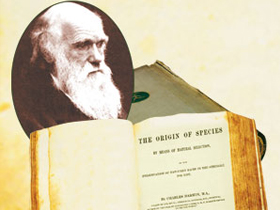In his book, which he described as a "long argument," Darwin claimed that all living things on Earth shared a common origin and that living things descended from one another by way of natural selection.
In addition, Darwin said that only those best able to adapt to their environment handed on their characteristics to subsequent generations. Over the course of time, these beneficial changes would accumulate, and living things would turn into other forms of life very different from their ancestral species. Man was the most advanced product of so-called natural selection. Darwin thought he had found the origin of species: The origin of any one species was another, earlier species.
Darwin's greatest difficulty was that paleontology, the science he hoped would provide answers to the problems facing his theory, would in fact only make them worse.
To be fair, he was aware of at least some of these problems. In the appendix to his book, titled "Difficulties of the Theory," he even admitted them. However, the answers he supplied to these problems lacked any scientific validity. The American physicist Lipson comments on Darwin's "difficulties":
On reading The Origin of Species, I found that Darwin was much less sure of himself than he is often represented to be; the chapter entitled "Difficulties of the Theory," for example, shows considerable self-doubt. As a physicist, I was particularly intrigued by his comments on how the eye would have arisen. 138
Darwin hoped that as scientific research progressed, these difficulties would be resolved. On the contrary, however, later scientific findings only worsened them.
138. H. S. Lipson, "A Physicist's View of Darwin's Theory," Evolution Trends in Plants, Vol. 2, No. 1, 1988, p. 6.


